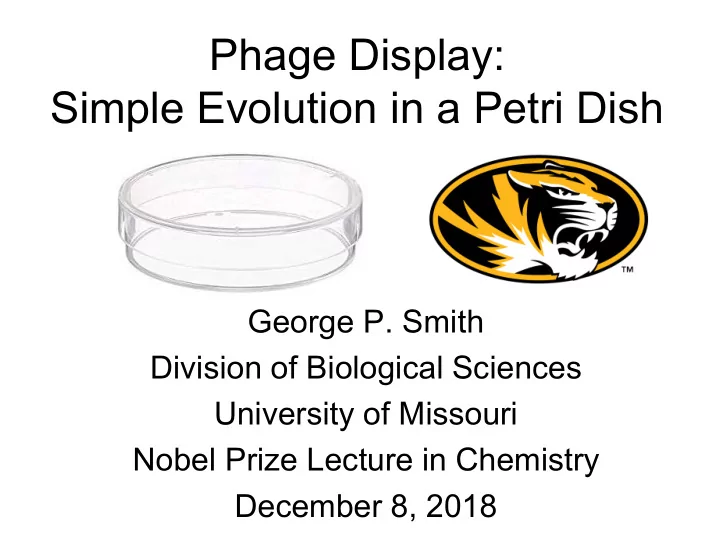

Phage Display: Simple Evolution in a Petri Dish George P. Smith Division of Biological Sciences University of Missouri Nobel Prize Lecture in Chemistry December 8, 2018
Margie did not invent phage display
My science community • Molecular biologists • Evolutionary biologists Phage • Immunologists display • Protein chemists • Phage biologists • Mathematicians • Philosophers of science • Bayesian statisticians
Our science community • Molecular biologists • Evolutionary biologists Phage • Immunologists display • Protein chemists • Phage biologists • Mathematicians • Philosophers of science • Bayesian statisticians
Phage = virus that infects bacteria
Filamentous phage
Filamentous phage
Filamentous phage 6 nm ~1 µ m
Crash course in molecular biology
Crash course in molecular biology
Filamentous phage infection cycle (simplified)
Bob Webster, Department of Biochemistry, Duke University (now retired to North Carolina coast)
Paul Modrich Nobel Prize in Chemistry, 2015
Why is that interesting? Please wait…
Darn good colleague Steve Parmley Steve developed a practical phage display vector (after some false starts like pIG3C) and affinity selection as grad student, 1985-1988.
Darn good colleague Jamie Scott Jamie Scott first demonstrated affinity selection of peptides from large random peptide libraries as postdoc, 1988-1991.
Darn good colleague Robert Davis Robert Davis came to the lab as chief manager and technician in the summer of 1989. We calculate that he sequenced a million DNA bases using old-fashioned radioactive technology.
The S-protein system Fred Richards at Yale, late 50’s; brought to our lab by John Ladbury and David Schultz
Pretend “receptor” “ Pretend “natural ligand”
S-protein “receptor” Jinan Yu, now a researcher at Hainan University, China.
Random peptide library
Random peptide library 10 15 phages representing 250 million phage clones, each clone displaying a different 15-amino acid guest peptide. [T. Nishi et al., FEBS Letters 399, 237–240 (1996)]
?
Affinity selection
Dominant sequence among selected peptides NRAWSEFLWQHLAPV Selected peptide KETAAAKFERQHMDSSTSAA (one-letter abbreviations for amino acids) Buried amino acids
Dominant sequence among selected peptides aligns with S-peptide “natural ligand” NRAWSEFLWQHLAPV Selected peptide KETAAAKFERQHMDSSTSAA S-peptide Buried amino acids
Artificial evolution in the petri dish Evolution in the living Affinity-selection from world random peptide libraries • Diversification • Construction of library • Natural selection • Affinity selection • Adaptation • Peptide with desired activity
Cure for S- protein disease
Cure for S- protein disease Selection scheme 2 Marvel 2
Cure for S- protein disease Selection scheme 2 Marvel 2 Marvel 3
Recommend
More recommend